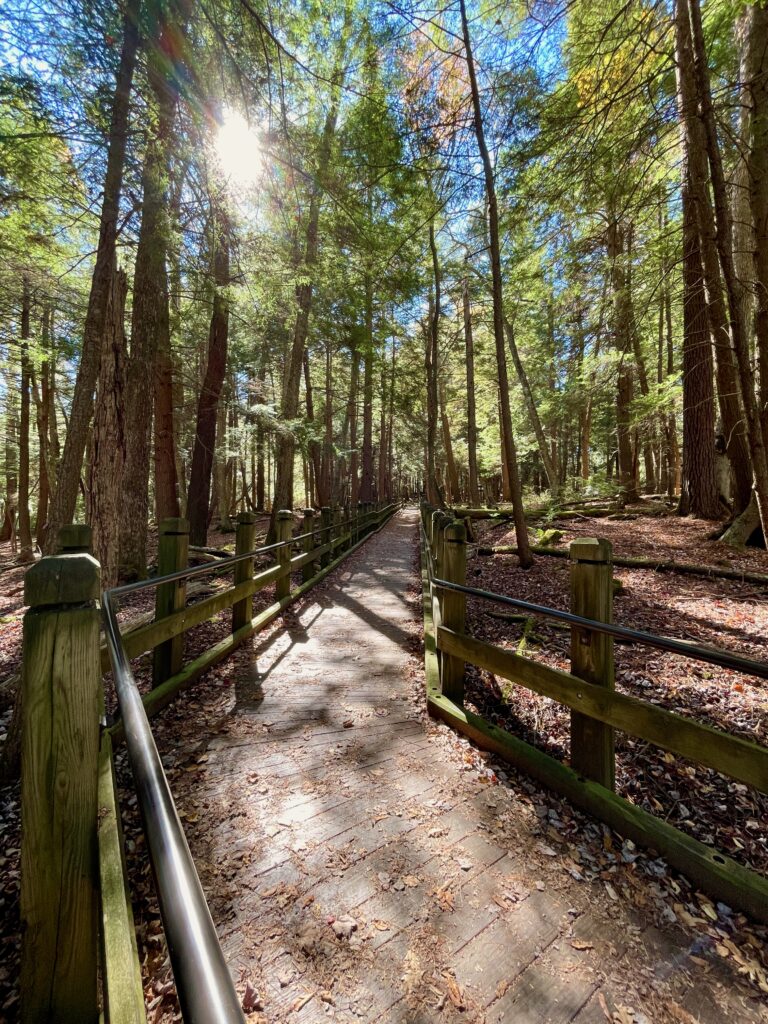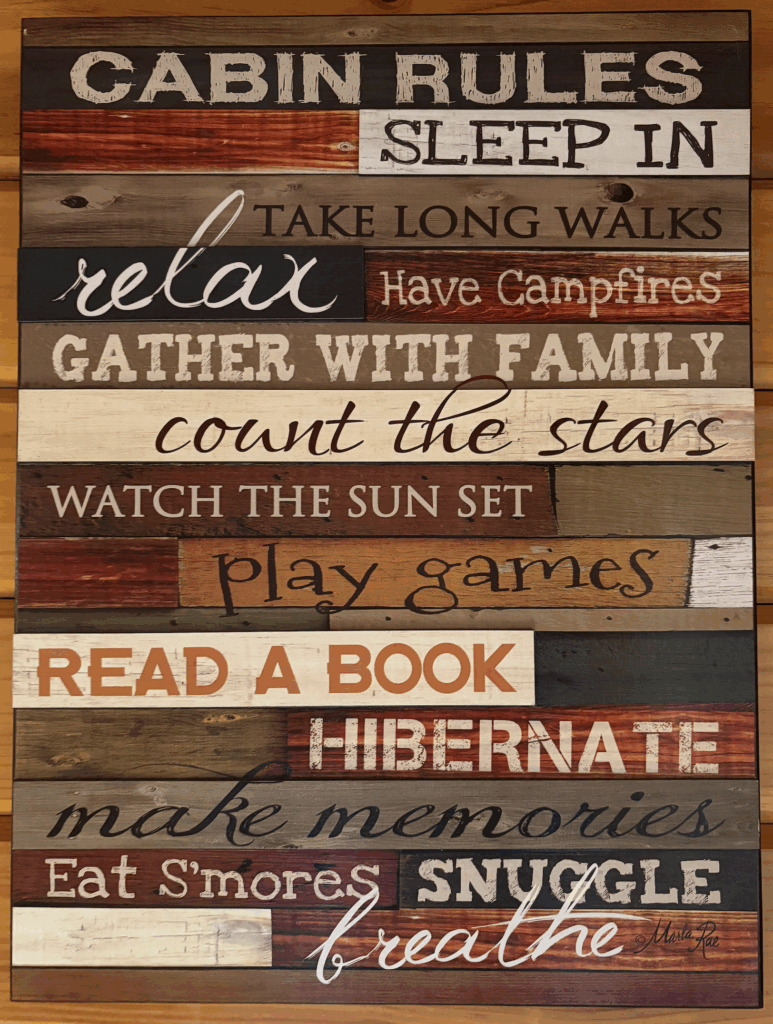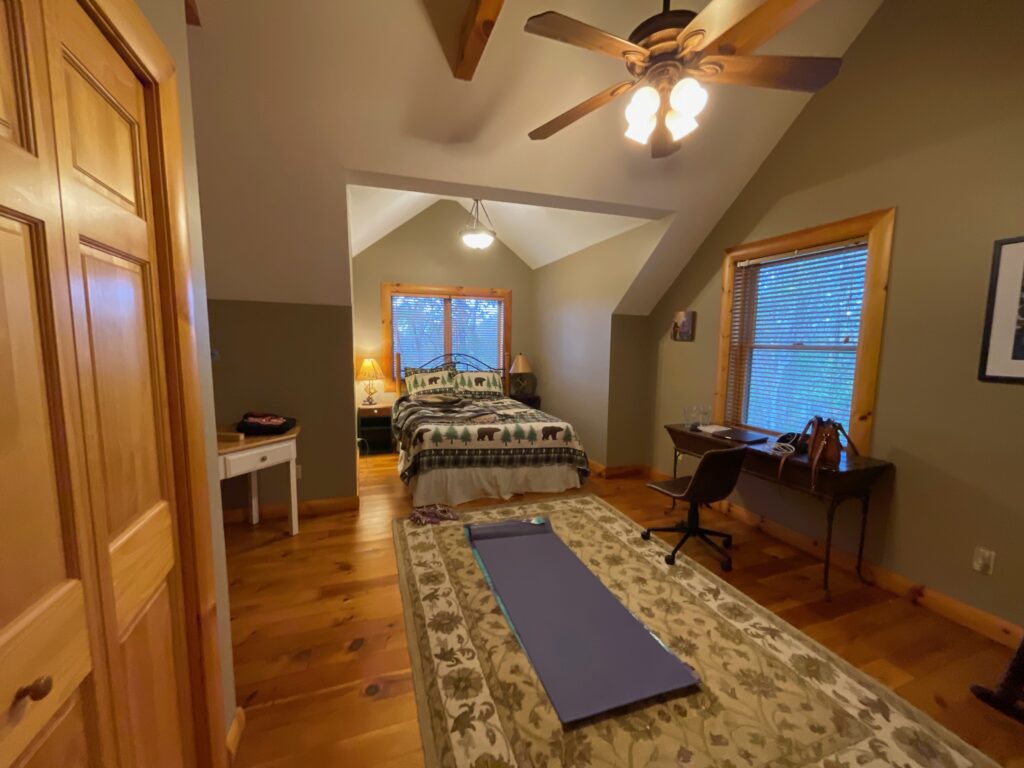A weekend away with my college friends loosened something I hadn’t realized was clenched.
(And if my friends are reading this, they are thinking “butt” right now. Yes, we all graduated from college. No, our minds never left middle school.)
The road to the rental cabin stopped roading about a mile away. The concrete was pockmarked and potholed, crumbling to literal dust. Leaves collected in the deepest bits, bouncing my little sedan in ways meant for monster trucks.
The cabin was built into the side of a wooded hill and felt truly isolated. New construction, the kind of place meant for large gatherings — 3 living rooms, an oversized kitchen and 4 bedrooms all with their own modern bathrooms.
We stayed up late chatting, we wrestled a puzzle with missing pieces into sweet submission, we hiked rocky trails, we cooked and ate our own food. On the 4th morning I felt different—not just rested but released. My body, from jaw to calves, had gone quiet in a way I hadn’t known it could.
The most surprising part was my legs. They felt light—dancer-light. Dance has always been a part of my life, despite little formal training. It’s something I’ve always done and at times, even performed professionally. (Again, NOT as a cage dancer. I keep telling my sorority sisters that it wasn’t me in a cage, dancing in a metallic body suit in a Pittsburgh night club in the summer of ‘92. They never believe me.)
After such deep rest, I felt a buoyant readiness I hadn’t felt in years. It wasn’t energy exactly; it was permission.
Vacation (and rehab, coincidentally) is meant to remove us from daily obligations —work, laundry, bills, volunteer conscriptions. Certain trips, especially solo ones, go further: they free us from obligations to others, from the constant hum of expectation. No worrying about anyone else’s plans for our time or energy. We follow our own flow.
These are such good and old friends, it was almost like flying solo. There was no performance required. I felt so rested. My body had remembered how to exist without bracing for anyone else’s expectations.
That memory followed me home like a tune stuck in my head.
A few nights later at a friend’s house, cartons of Rita’s Water Ice appeared. (For those of you not from Philly, this is an Italian ice treat: finely-crushed ice with flavoring.) I didn’t want any. I’d been eating lighter, avoiding sugar. But after repeated offerings and before my mind could intervene, I heard myself say, “Sure, I’ll have the mango.”
An hour later, I had that familiar post-sugar fog and the tiny inner scolding that comes with it. No one else cared whether I ate it or not. The only pressure had been internal—muscle memory of compliance.
Therapy has taught me that this kind of reflex is a trauma response: the nervous system’s way of keeping the peace. But understanding that intellectually is one thing; feeling the alternative is another. It had been so long since I had felt that unencumbered state, it was almost a shock when it happened.
It’s a state where you are almost oblivious of other people’s wants. Like a little kid discovering a new playground, you just feel pure excitement— not guilt about your parents waiting on the bench.
Equating kindness with compliance is an anxious transaction. Peace-keeping isn’t always love, and people-pleasing can be toxic. True generosity begins only after self-permission. When you let yourself exist freely—when you trust that your worth isn’t on trial—you stop giving to avoid guilt and start giving because you genuinely want to. That’s an authentic existence.
These days, I’m experimenting with retraining that lesson into my muscles. Before a workout or even a morning stretch, I repeat a mantra that came to me like a heartbeat:
Light in my body, joy to my core.
Remember “Light as a feather, stiff as a board?” That’s the rhythm that came to me. That sleepover-rite-of-passage was one of the few truly engrossing rituals I experienced as a kid: all of us chanting together, waiting for the exact right moment to act as one. (By the way: there are real laws of physics that answer why this trick sometimes worked.)
It’s just 8 words, 9 syllables, but “Light in my body, joy to my core” calls me back to a kid-like sense of buoyant freedom. I hope to say it not only when I exercise, but also when I catch myself about to agree to something I don’t want. Each repetition is a small act of reprogramming my muscles to hold this paradigm of self-respect.
Maybe that’s what growing older means: learning to grant ourselves the permissions no one else can bestow. To rest when we’re tired. To eat—or not eat—the water ice. To remember that generosity, real generosity, flows best from muscles (and butts) that aren’t clenched.



